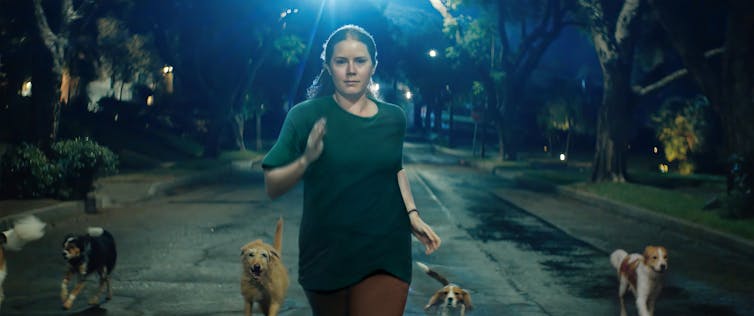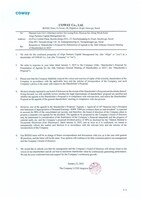“Motherhood,” the beleaguered stay-at-home mother of Nightbitch tells us in contemplative voice-over, “is probably the most violent experience a human can have aside from death itself”.
Increasingly depicted as a source of frustration, resentment and rage, the film sets out to show motherhood is also far more savage and feral than the anodyne images posted on social media by retrograde tradwives or mumfluencers would have us believe.
As Nightbitch puts it, it’s “fucking brutal”.
Adapted by Marielle Heller from Rachel Yoder’s 2021 novel of the same name, the film stars Amy Adams as Mother, an unnamed installation artist who places her career on hold to raise her young son.
Wrung out by the demands of motherhood and increasingly furious with the lack of support she receives from her incompetent and often absent Husband (Scoot McNairy), Mother starts to spiral out of control, morphing into a dog complete with tail, sharpened canines, extra nipples and a ravenous desire for raw meat.
This transformation places the film squarely within a long representational history of monstrous mothers.
Monstrous motherhood
Writing in 1993, feminist film scholar Barbara Creed famously declared
all human societies have a conception of the monstrous-feminine, of what it is about woman that is shocking, terrifying, horrific, abject.
Anxieties about women’s bodies and their sexuality permeate cultural products, ranging from Freudian jokes to the duplicitous femme fatale of film noir.
This is especially true for the reproductive female body, whose unsettling ability to transform and multiply simultaneously threatens and fascinates. The horror genre is rich with examples, which critic Erin Harrington has helpfully termed “gynaehorror”.
Nightbitch takes this fear literally, drawing on magic realism and horror tropes to show the visceral and psychological metamorphosis women undergo on becoming mothers (a phenomenon known as matrescence).
Disney+
In one scene, Mother gouges into a cyst on her spine, releasing oozing, seeping pus before pulling out a tail. In another, she gluttonously devours cafeteria mac and cheese with her bare hands.
This surrealist turn promises to take us into the terrain of full feminist body horror (an experience that audiences are clearly up for, if the success of last year’s The Substance is anything to go by). But Nightbitch loses the courage of its convictions. By her own admission, Heller has an aversion to violence and the decision to dampen the gore was a deliberate one.
Unfortunately, this is to the detriment of the film. While it is unclear in Yoder’s absurdist novel whether Mother’s transformation is real or merely metaphorical allegory, the adaptation to film demands this be taken literally – at least at a visual level.
Heller’s refusal to lean into the body horror results in a neutered narrative with more bark than bite.
Death of the self
Nightbitch is the latest in a string of contemporary films and television series about motherhood and its discontents. Other titles include Tully (2018), The Let Down (2017–19), Working Moms (2017–23), Big Little Lies (2017–19) and the Bad Moms films (2016–17).
These texts put mothers front and centre. Stylistically different, and not without their individual problems, they are unified in their efforts to portray the messy reality of motherhood.
Adams’ portrayal of the invisibility and grief she experiences as a new mother will resonate with many viewers. An opening montage of Mother frying hashbrowns, reading bedtime stories and playing trucks ad nauseam deftly establishes the boredom and inertia of early motherhood. Sleep-deprived and terrified she’ll never be “smart or happy or thin ever again”, Mother has become unrecognisable to her pre-baby self.
When Husband asks in the middle of a fight “What happened to the girl I married?”, she replies, “She died in childbirth”.
The idea that motherhood is akin to a loss of selfhood isn’t revelatory or new; nor is Nightbitch’s approach. The film’s over-reliance on Adams’ voice-over to deliver lengthy didactic monologues is heavy-handed.

Disney+
More unusual is Nightbitch’s suggestion that successful motherhood can also be depleting and a source of profound ambivalence.
Nightbitch is quick to show us Mother is, in fact, a good mum – playful, attentive and affectionate with her son. Warm, golden lighting infuses their scenes together creating an intimate private world shared by mother and child.
Mother, it would seem, is doing everything right.
Her guilty admission she is “not doing OK” comes in spite of this. Nightbitch teases us with the idea the problem lies not with Mother but with motherhood itself.
This is an important distinction maternal scholars have been championing since the publication of Adrienne Rich’s groundbreaking work Of Woman Born: Motherhood as Experience and Institution in 1976.
Once again, however, Nightbitch disappointingly fails to deliver.
Despite having laboured to show the corrosive impacts that rigid gender norms and societal expectations can have on mothers, Nightbitch offers an individualised solution to this systemic problem.

Disney+
Fed up with Husband’s ineptitude, Mother initiates a separation, bonds with her fellow mum-friends, takes up running and throws herself back into her art. Apparently, all she really needed to do was find her pack and carve out some “me time”. Although Yoder’s book likewise concludes with Mother channelling her rage into her art, the separation and subsequent reconciliation subplot with Husband is an addition to the film.
This curious pivot shuts down the film’s articulation of maternal ambivalence and perinatal depression, as well as its critique of the weaponized incompetence exhibited by straight men in their romantic and family relationships.
Nightbitch’s ending certainly feels weird and surreal – just not in the way audiences might hope.
Nightbitch is streaming on Disney+ in Australia and New Zealand from today.







